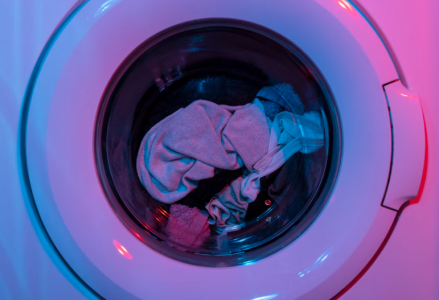The surprising reason experts say to skip fabric softener in your wash
- Replies 0
Laundry is one of those never-ending household tasks that always seems to return no matter how often you do it.
For many people, adding a splash of fabric softener or tossing in an extra scoop of detergent feels like a small but reliable shortcut to fresher, cleaner clothes.
But new expert advice is now suggesting that these everyday habits, which many have long believed to be harmless or even helpful, may actually be quietly doing more harm than good over time.
What appears to be a simple routine may in reality be leaving behind hidden problems that affect not only the clothes you wear but also the skin you live in.
Rebecca Jakeman, a senior researcher and writer at Which?, has revealed that fabric softener is not the laundry hero many believe it to be.
Instead of making clothing softer, she explained that the liquid leaves a residue behind that builds up over time.
This coating makes it harder for detergent to penetrate fibers, reducing the effectiveness of a wash. Towels in particular suffer, as their absorbency declines significantly when repeatedly exposed to fabric softener.
Beyond the performance of your laundry, there are also concerns about health effects. Jakeman warned that fabric softener can cause irritation, especially for people with sensitive skin.

She pointed out that invisible traces left on clothing continue to touch the skin long after the wash cycle ends. What starts as a harmless habit could easily lead to rashes or discomfort for those who are vulnerable to chemical reactions.
It is not just fabric softener that is raising red flags—detergent is another culprit when used in excess.
Jakeman explained that while many people believe adding more detergent will help fight tough stains, the result is often the opposite.
Residue is left behind after the rinse cycle, leaving dark clothing streaked with white marks and lighter items carrying unseen traces. For those with sensitive skin, this buildup can cause similar irritation issues to fabric softener.
Also read: He turned cleaning into a joyful ritual—here’s how you can too!
So how much detergent is actually necessary? Jakeman suggested that, in general, one tablespoon is enough for a small load, while two tablespoons should cover larger loads.
The precise amount can vary depending on the program and machine type, which is why she emphasized checking the washing machine manual for proper guidelines.
Guessing the amount by eye often leads to overuse, making measuring a simple but important step to protect clothes and skin.
The advice might surprise those who rely on the familiar scent and feel that fabric softeners and detergents provide.
Also read: Transform your bathroom like a pro with these insider deep cleaning shower secrets
But Jakeman stressed that sticking to measured amounts of detergent and skipping fabric softener altogether leads to cleaner, longer-lasting clothes.
Towels regain their proper absorbency, everyday items wash more effectively, and irritation risks are minimized.
For anyone looking to protect their skin and wardrobe, these changes could make laundry less of a problem in the long run.
Read next: Does vinegar really clean everything? Here’s what it works on—and what it doesn’t

Are you guilty of overloading the detergent or relying on fabric softener for freshness? Maybe it’s time to rethink your laundry habits and give your clothes—and your skin—a cleaner start.
For many people, adding a splash of fabric softener or tossing in an extra scoop of detergent feels like a small but reliable shortcut to fresher, cleaner clothes.
But new expert advice is now suggesting that these everyday habits, which many have long believed to be harmless or even helpful, may actually be quietly doing more harm than good over time.
What appears to be a simple routine may in reality be leaving behind hidden problems that affect not only the clothes you wear but also the skin you live in.
Rebecca Jakeman, a senior researcher and writer at Which?, has revealed that fabric softener is not the laundry hero many believe it to be.
Instead of making clothing softer, she explained that the liquid leaves a residue behind that builds up over time.
This coating makes it harder for detergent to penetrate fibers, reducing the effectiveness of a wash. Towels in particular suffer, as their absorbency declines significantly when repeatedly exposed to fabric softener.
Beyond the performance of your laundry, there are also concerns about health effects. Jakeman warned that fabric softener can cause irritation, especially for people with sensitive skin.

The surprising reason experts say to skip fabric softener in your wash. Image source: engin akyurt / Unsplash
She pointed out that invisible traces left on clothing continue to touch the skin long after the wash cycle ends. What starts as a harmless habit could easily lead to rashes or discomfort for those who are vulnerable to chemical reactions.
It is not just fabric softener that is raising red flags—detergent is another culprit when used in excess.
Jakeman explained that while many people believe adding more detergent will help fight tough stains, the result is often the opposite.
Residue is left behind after the rinse cycle, leaving dark clothing streaked with white marks and lighter items carrying unseen traces. For those with sensitive skin, this buildup can cause similar irritation issues to fabric softener.
Also read: He turned cleaning into a joyful ritual—here’s how you can too!
So how much detergent is actually necessary? Jakeman suggested that, in general, one tablespoon is enough for a small load, while two tablespoons should cover larger loads.
The precise amount can vary depending on the program and machine type, which is why she emphasized checking the washing machine manual for proper guidelines.
Guessing the amount by eye often leads to overuse, making measuring a simple but important step to protect clothes and skin.
The advice might surprise those who rely on the familiar scent and feel that fabric softeners and detergents provide.
Also read: Transform your bathroom like a pro with these insider deep cleaning shower secrets
But Jakeman stressed that sticking to measured amounts of detergent and skipping fabric softener altogether leads to cleaner, longer-lasting clothes.
Towels regain their proper absorbency, everyday items wash more effectively, and irritation risks are minimized.
For anyone looking to protect their skin and wardrobe, these changes could make laundry less of a problem in the long run.
Read next: Does vinegar really clean everything? Here’s what it works on—and what it doesn’t
Key Takeaways
- Fabric softener leaves a residue that reduces cleaning power and can irritate sensitive skin.
- Towels lose absorbency after repeated exposure to softener.
- Using too much detergent leaves streaks and chemical traces in clothes.
- Experts advise one to two tablespoons of detergent, measured carefully, instead of guesswork.






